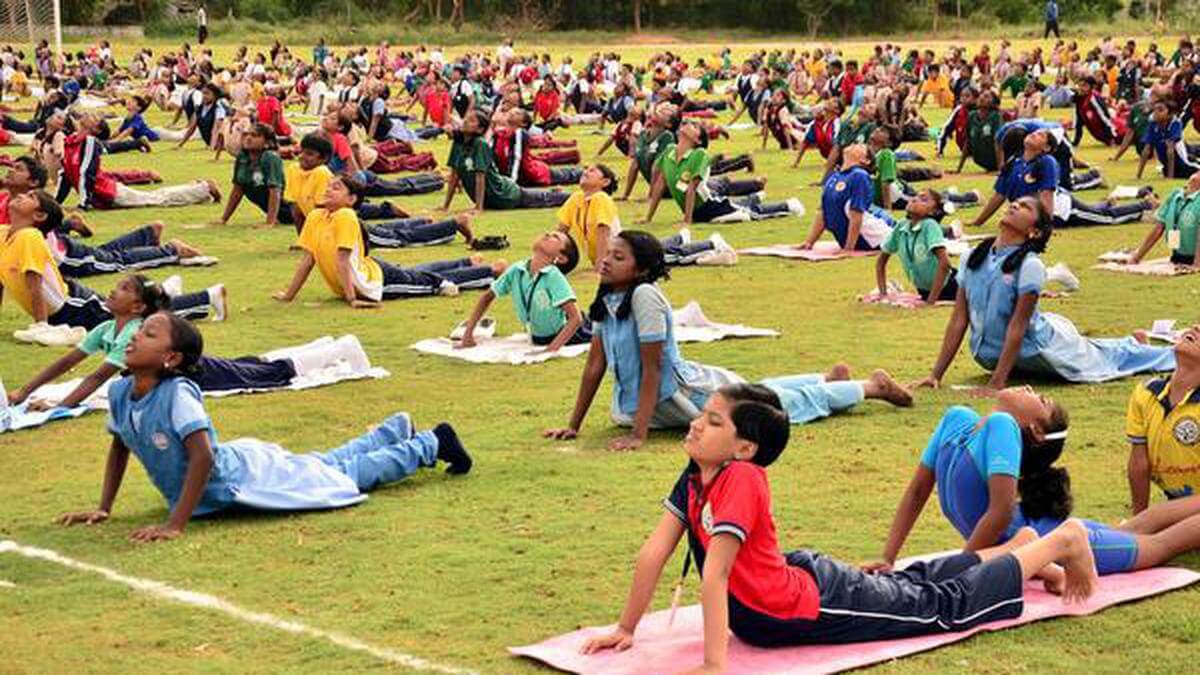The Importance Of Fitness Education In Today's World

The Importance Of Fitness Education In Today's World
In today's world, where sedentary lifestyles and unhealthy habits are increasingly common, fitness education has become more important than ever! By promoting physical activity and healthy lifestyle habits, fitness education can help prevent chronic diseases, improve mental health, and enhance overall quality of life. In this blog, we will explore the benefits of fitness education, the state of fitness education in schools, and strategies for promoting fitness education.
The Benefits of Fitness Education?
Physical Benefits:

Fitness education can have numerous physical benefits, including improved health and fitness levels, reduced risk of chronic diseases, and increased energy levels & better sleep. By engaging in regular physical activity, students can improve their cardiovascular health, build strength and endurance, and reduce their risk of obesity, diabetes, and other chronic diseases.
Improved health and fitness levels:-
Fitness education can lead to improved health and fitness levels by promoting regular physical activity. Engaging in activities such as cardio, strength training, and flexibility exercises can improve cardiovascular health, increase strength and endurance, and reduce the risk of chronic diseases such as heart disease, diabetes, and obesity. Regular physical activity has also been shown to enhance immune function, leading to better overall health.
Reduced risk of chronic diseases :-

Physical inactivity is a major risk factor for chronic diseases, and fitness education can help mitigate this risk. By promoting regular physical activity, fitness education can help prevent conditions such as heart disease, stroke, diabetes, and certain types of cancer. Exercise has also been shown to improve insulin sensitivity, which can help prevent or manage type 2 diabetes. By adopting healthy habits early in life through fitness education, individuals can significantly reduce their risk of developing chronic diseases later in life.
Increased energy levels and better sleep

Regular physical activity has been shown to increase energy levels and improve sleep quality. By engaging in physical activity, individuals can increase blood flow and oxygen to the brain, leading to improved cognitive function and alertness. Exercise has also been shown to reduce feelings of fatigue and improve overall mood. Furthermore, regular physical activity can improve sleep quality, helping individuals fall asleep faster and stay asleep longer. By incorporating fitness education into daily routines, individuals can improve their energy levels and overall quality of life.
Mental Benefits:

In addition to physical benefits, fitness education can significantly improve mental health by reducing stress and improving mood. Regular physical activity has been shown to increase endorphin levels, which can help alleviate symptoms of depression and anxiety. Exercise has also been linked to improved cognitive function and memory, which can benefit students' academic performance. Here are the top 3 benefits:
Improved mood and reduced stress:-

Fitness education can have a profound impact on mental health by reducing stress and improving mood. Physical activity has been shown to increase the production of endorphins in the brain, which can lead to feelings of happiness and pleasure. Exercise has also been shown to reduce levels of the stress hormone cortisol, helping individuals feel more relaxed and less anxious. By incorporating regular physical activity into their routines through fitness education, individuals can experience these mood-enhancing benefits and reduce their overall stress levels.
Increased self-confidence and self-esteem :-

Regular physical activity through fitness education can also lead to increased self-confidence and self-esteem. As individuals become more physically fit and capable, they may feel more confident in their abilities to achieve their goals. Exercise has been shown to improve body image, helping individuals feel more positive about their appearance and overall sense of self. By promoting regular physical activity and healthy habits through fitness education, individuals can experience these positive effects on self-confidence and self-esteem.
Improved cognitive function and memory:-

Physical activity has also been shown to have a positive impact on cognitive function and memory. Exercise has been linked to improved brain function, including increased blood fow to the brain, improved neuron growth, and increased production of neurotransmitters that are important for cognitive function. Regular physical activity through fitness education can also improve memory, attention, and learning ability. By incorporating physical activity into their routines through fitness education, individuals can experience these cognitive benefits and improve their overall brain function.
The State of Fitness Education in Schools in India :-

Unfortunately, despite the numerous benefits of fitness education, it is often underfunded and undervalued in schools. Many schools prioritize academic achievement over physical activity, leading to a lack of resources and funding for physical education programs.
This has resulted in decreased levels of physical activity among students and increased rates of obesity and chronic diseases. The current state of fitness education in schools is concerning, with many institutions lacking the necessary funding and resources to provide quality physical education programs. The emphasis on academic achievement over physical health has also resulted in a decrease in the amount of time and resources allocated to fitness education.
Lack of funding and resources:-

Many schools struggle to provide adequate funding for physical education programs, resulting in a lack of resources such as equipment, facilities, and qualified teachers. Consequently, many schools have had to cut back on their physical education programs or eliminate them altogether. Numerous top Indian athletes have cited this as the number one issue affecting their career progression, highlighting the disparity between academic performance and physical passion in many students.
( For Making Your Career in fitness industry Here... )
Emphasis on academic achievement over physical health :-

With increasing pressure on schools to improve academic performance, physical education has taken a backseat. As a result, students are not getting the exercise and physical activity they need to maintain good health. The consequences of the current state of fitness education in schools are far-reaching, affecting not only the physical health of students but also their mental health and academic performance.
Increased rates of obesity and chronic diseases:-

The lack of physical activity in schools has contributed to rising obesity rates and chronic diseases such as diabetes and heart disease among students.
Poor physical and mental health among students:-

Physical activity has been linked to improved cognitive function and academic performance. The absence of physical education in schools can lead to decreased academic performance and productivity among students.
Decreased academic performance and productivity:

Physical activity has been linked to improved cognitive function and academic performance. The lack of physical education in schools can result in decreased academic performance and productivity among students.
It is crucial for schools to prioritize physical education and provide the necessary resources to ensure that students receive the exercise and physical activity they need to maintain good health and academic success.
How to Promote Fitness Education:
To promote fitness education in schools, it is essential to implement strategies that prioritize physical activity and provide the necessary resources to ensure that students receive the exercise they need to maintain good health.
Advocating for increased funding and resources:

School administrators, parents, and students can advocate for increased funding and resources for physical education programs. This can include lobbying for more gymnasiums, equipment, and qualified teachers to provide quality fitness education.
Implementing fitness programs and initiatives:

Schools can develop fitness programs and initiatives that encourage physical activity among students. This can include extracurricular sports teams, after-school fitness clubs, and health and wellness programs that promote healthy lifestyle habits.
Incorporating physical activity into academic curriculum:

Physical activity can also be incorporated into academic curriculum through movement-based learning strategies. This can include activities such as standing desks, classroom yoga, and outdoor learning experiences that provide students with the opportunity to engage in physical activity while learning.
Improved physical and mental health of students:

Regular physical activity can enhance overall physical and mental health among students. This includes improved cardiovascular health, reduced rates of obesity and chronic diseases, and increased mental health and well-being.
Increased academic performance and productivity:

Studies have shown that regular physical activity can improve cognitive function, memory, and academic performance. This can result in increased productivity and academic performance among students.
Reduced healthcare costs and improved overall quality of life:

Promoting fitness education in schools can lead to reduced healthcare costs over time due to improved health outcomes. Additionally, regular physical activity can enhance overall quality of life by promoting healthy habits and reducing the risk of chronic diseases.
Promoting fitness education in schools is essential for improving the health and well-being of students while also increasing academic performance and reducing healthcare costs over time. It is important to implement strategies that prioritize physical activity and provide the necessary resources to ensure that students receive the exercise they need to maintain good health.
Conclusion :-
Fitness education is crucial in today's world to promote the physical and mental health of individuals. With the rise of chronic diseases and sedentary lifestyles, it is essential to prioritize physical activity and healthy habits in our education systems. By investing in fitness education, we can empower individuals to lead healthier lives, improve their academic performance, and reduce the burden of chronic diseases on society. Let us work together to create a healthier future through fitness education!
Guides
- Benefits of Protein
- 7 Healthy Eating Habits
- 7 Most Effective Exercises At Home
- Home Workout Plan Without Equipment
- Top 10 Biggest Nutrition Myths
- How To Get Flexible Body?
- Weight Loss VS Fat Loss
- What is Keto Diet?
- What Is Minerals?
- What Is Digital Marketing ?
- Best Free Tools For Beginner You Tubers
- Best Teas For Weight Loss & Fat Burning
- Green Tea: Health Benefits And Side Effects
- Yoga for Weight Loss and Fat Burning
- What Is Type-2 Diabetes?
- How To Write Eye-Grabbing Resume
- The Ultimate Guide To Prepare For An Interview
- 10 Best Health Benefits Of Eating Mango
- healthy eating habits for kids
- 10 tips for starting your Fitness Transformation
- 10 Reasons Why People Hate Gym & How to Overcome Them
- Fuel Your Passion For Nutrition: Explore The Power Of A Nutrition Course
- Shed Pounds with Ease: Vegetarian Diet Plan for Weight Loss Revealed!
- Anabolic steroids: Types, Uses, and Side Effects
- Find Your Path to Success: Choosing the Right Fitness Certification Program in India
- learn gym trainer course offline at surat with best faculties
- Learn about Body Composition and How it Affects Your Health
- Nutrition course online with affordable fees
- Online Dietitian Plan vs In-Person Consultation: Which is Right for You?
- The Importance Of Fitness Education In Today's World
- How to find right fitness institute in india
- How to Actually Build Muscle When You Work Out
- Is Becoming a Gym Trainer in India Worth It?
- Why Online Dietician Courses Are in High Demand in India: A Practical Guide for Future Professionals
- 7 Powerlifting Training Mistakes Beginners Still Make & (How to Fix)
- Top 10 Evidence-Based Immunity-Boosting Habits to Stay Healthy in 2025
- What Can You Do After Personal Trainer Certification? Real Career Outcomes 2026


About Dr.Gautam Jani
Dr. Gautam is a civil engineer. By passion he is a dietitian and had started practising it in the year 2016. He is the founder of fitnesswithgomzi firm established in 2018. He has achieved many certificate from ACSM, ISSA and VLCC.

